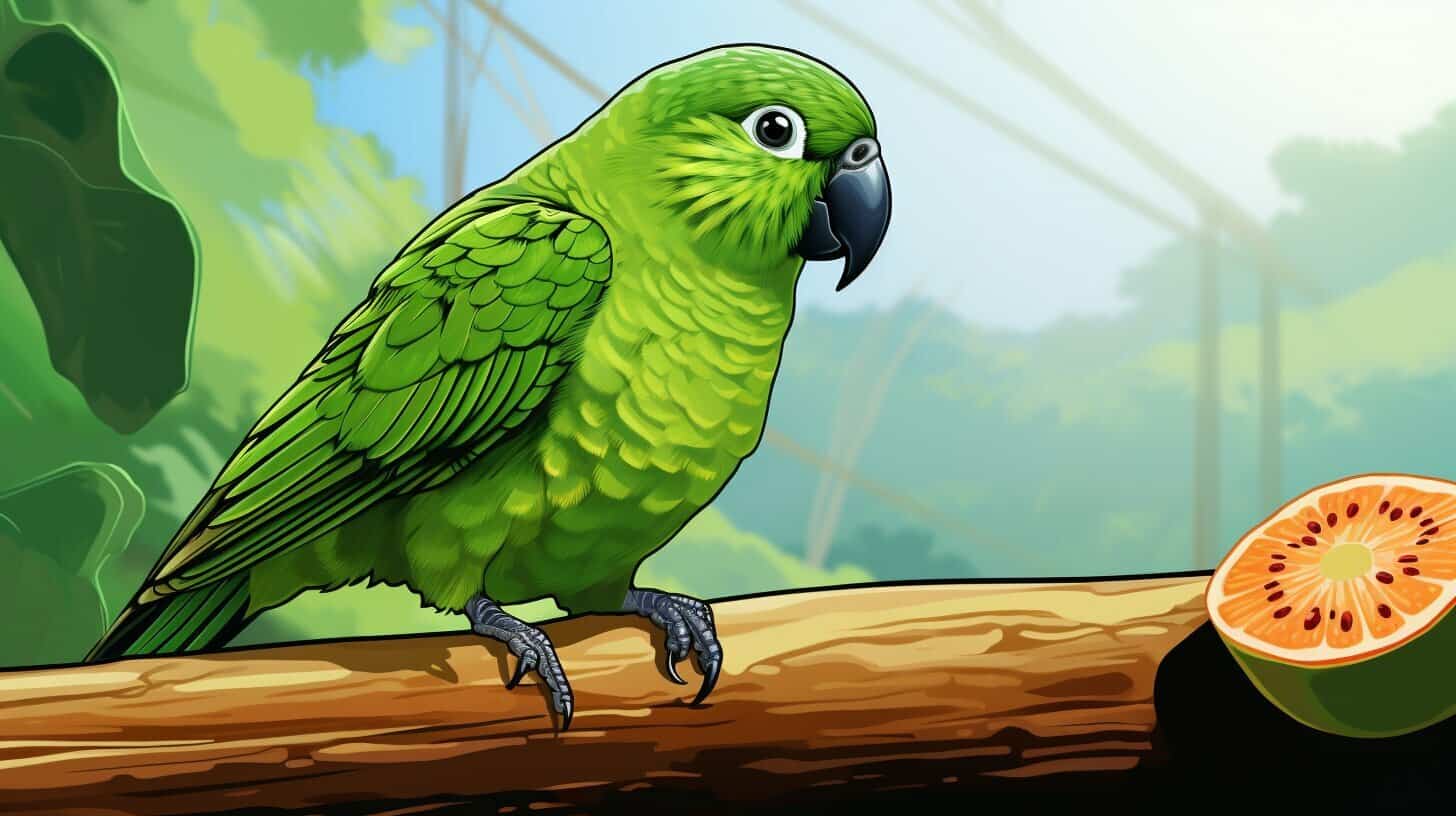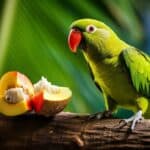Welcome to our comprehensive bird care guide where we will be discussing the dietary needs of kakarikis, a popular pet bird breed among bird enthusiasts. One of the frequently asked questions we receive from our readers is whether kakarikis can eat cucumber. We understand that providing a nutritious and balanced diet for these birds is crucial for their overall health and wellbeing. Therefore, in this article, we will explore the topic in detail and provide you with all you need to know about feeding cucumber to your kakarikis. Let’s dive in!
Can kakarikis eat cucumber? Yes, kakarikis can eat cucumber. It’s safe for them and can be a healthy addition to their diet. However, remember to offer it in moderation and as part of a balanced diet. Always wash the cucumber thoroughly and remove any seeds or skin, as they can be difficult for the birds to digest. Providing a variety of fresh vegetables and fruits is essential for their well-being.
Understanding Kakariki Diet and Feeding Habits
As with any pet bird, it is essential to understand kakarikis’ dietary needs and feeding habits to ensure their health and well-being. These energetic and playful birds require a balanced diet that meets their nutritional requirements. A healthy kakariki diet should consist of a variety of foods, including seeds, pellets, fruits, vegetables, and occasional treats.
Seeds and pellets are the staple of a kakariki’s diet, providing essential nutrients such as protein, fibre, and vitamins. However, it is crucial to supplement their diet with fresh fruits and vegetables to ensure they receive a complete range of nutrients.
When introducing new foods to a kakariki’s diet, it is important to do so gradually. Start with small amounts and monitor their response. If they show any signs of discomfort or digestive issues, stop feeding the new food and consult a veterinarian. It is also essential to ensure that any fruits or vegetables offered to them are fresh, clean and safe for consumption.
Feeding Cucumber to Kakarikis
Cucumber is a safe and nutritious food that can be fed to kakarikis in moderation. It is low in calories and water content and provides essential vitamins and minerals, making it an excellent addition to their diet. However, cucumber should not be the only source of vegetables in their diet.
Feeding cucumber to kakarikis should not replace their pellet or seed diet. Instead, it should be offered as a supplement to their existing diet, providing variety and nutritional benefits.
When feeding cucumber to kakarikis, it is recommended to remove the skin, as it can be difficult for them to digest. It is also essential to slice it into small pieces, making it easier for them to eat and reducing the risk of choking.
Cucumber can be a healthy and enjoyable addition to a kakariki’s varied diet, as long as it is offered in moderation and alongside other safe fruits and vegetables.
Exploring the Benefits of Feeding Cucumber to Kakarikis
Cucumbers are a refreshing and nutritious addition to a kakariki’s diet. Not only are they low in calories, but they are also packed with essential vitamins and minerals that can contribute to their overall health and well-being.
One of the key benefits of feeding cucumber to kakarikis is its high water content. As birds do not have sweat glands, they rely on their diet to maintain hydration. Feeding them cucumber can therefore help prevent dehydration and promote healthy digestion.
Cucumbers also contain antioxidants, which can help boost their immune system and protect against disease. Additionally, they are a good source of vitamin K, which plays a role in blood clotting and bone health.
Another benefit of feeding cucumber to kakarikis is its low sugar content. A diet high in sugar can lead to obesity and other health problems in birds. By incorporating cucumber into their diet, owners can provide a healthy and tasty treat without the risk of excessive sugar intake.
Finally, cucumbers are a versatile fruit that can be served in various ways. Kakarikis may enjoy sliced or diced cucumbers as a refreshing snack, or they can be blended into a puree and served as a sauce over their regular food. The options are endless!
Safety Considerations for Feeding Vegetables to Kakarikis
Kakarikis can benefit from a diet that includes a variety of vegetables, including cucumber. However, taking precautions to ensure their safety when introducing new foods to their diet is important. Here are some safety considerations to keep in mind:
| Food safety | Precautions |
|---|---|
| Wash thoroughly | Before feeding vegetables to your kakariki, always make sure to wash them thoroughly to remove any dirt or contaminants that could cause harm. |
| Be careful with pesticides | Avoid feeding your bird vegetables that have been treated with pesticides or chemicals. These can be harmful to their health. |
| Introduce new foods gradually | When introducing a new food to your kakariki, start with a small amount and gradually increase it over a few days. This will allow your bird to adjust to the new food and minimize the risk of digestive problems. |
| Monitor your bird’s reactions | Keep a close eye on your kakariki’s reaction to new foods. If your bird shows signs of discomfort or illness after eating a new food, remove it from their diet and consult with your avian veterinarian. |
Remember to always provide your kakariki with a balanced diet that includes a variety of fruits, vegetables, and other foods to ensure they maintain optimal health. By following these safety considerations, you can safely incorporate cucumber and other vegetables into your bird’s diet.
Inclusion of Cucumber in a Varied Kakariki Diet
Cucumbers can be a healthy addition to a kakariki’s diet when offered in moderation. While they are not a primary food source for these birds, they can provide valuable nutritional benefits and variety to their diet.
It’s important to note that cucumbers should not replace essential foods in a kakariki’s diet, such as pellets, seeds, and fresh fruits and vegetables. Rather, cucumbers can serve as a supplement to these foods.
| Other fruits and vegetables | Benefits |
|---|---|
| Kale | High in calcium, vitamins A and C |
| Cauliflower | Good source of vitamin C and folate |
| Blueberries | Antioxidant properties, high in vitamin C and fibre |
When offering cucumbers to kakarikis, it’s best to slice them into small pieces or chop them up, making them easier to eat and digest. Owners should also monitor their bird’s response to cucumber and adjust their intake accordingly.
Remember, a varied and balanced diet is crucial to a kakariki’s overall health and well-being. Including appropriate amounts of cucumber and other fruits and vegetables can help ensure their nutritional needs are met.
Introducing Cucumber to Kakarikis’ Diet
If you’re planning to introduce cucumber to your kakariki’s diet, it’s important to do so gradually. Start with a small amount, and monitor their response. Some birds may take to it immediately, while others may be more hesitant.
It’s also essential to consider their overall diet and balance their intake of different food groups. While cucumber can be a nutritious addition to their diet, it should not be a substitute for other essential foods.
When feeding cucumber to your kakariki, ensure that it is ripe, fresh, and washed thoroughly. You can slice it into small pieces or grate it, depending on your bird’s preference. Avoid adding any seasoning or salt as it can be harmful to your bird.
If your kakariki shows signs of discomfort, such as vomiting or diarrhoea, after eating cucumber, consult with a veterinarian immediately.
Moderation and Monitoring
Although cucumber can provide several health benefits for your kakariki, it’s important to remember that moderation is key. Too much cucumber can upset their digestive system and lead to health issues.
To ensure your kakariki’s safety, monitor their cucumber intake closely. Signs of overfeeding include watery droppings, reduced appetite, and lethargy. If you notice any of these symptoms, immediately decrease their cucumber intake and consult with a veterinarian if necessary.
Remember, a balanced diet is essential for your kakariki’s health and well-being. In addition to cucumber, make sure to provide a variety of fruits, vegetables, and other dietary supplements that meet their nutritional needs.
Signs of an Unhealthy Kakariki Diet
It’s essential to monitor your kakariki’s diet to ensure they’re getting the proper nutrition they need. Here are some signs that your bird may not be getting the right balance of nutrients:
- Lethargy: If your bird seems unusually tired or inactive, it may be a sign that they’re not getting enough energy from their diet.
- Weight changes: Sudden weight gain or loss can indicate a problem with your bird’s diet. Monitor their weight regularly to make sure they’re staying within a healthy range.
- Dull feathers: A lack of essential vitamins and minerals can lead to poor feather quality, so if your kakariki’s feathers are looking less vibrant than normal, it may be time to reassess their diet.
- Behavioural changes: Changes in your bird’s behaviour, such as increased aggression or shyness, can be a sign that something’s not right. If your bird is acting differently than usual, it’s worth investigating.
Remember, a balanced and varied diet is key to keeping your kakariki healthy and happy. If you notice any of these signs, consulting with a vet or avian specialist is a good idea to determine the best course of action.
Conclusion
In conclusion, while it is safe for kakarikis to eat cucumber, it should be given in moderation as part of a well-balanced diet. It is important to remember that a varied diet is crucial for their overall health and well-being, and cucumber can be a great addition to their diet when given in the right amount.
Remember to always monitor your bird’s response and adjust accordingly. If you notice any signs of an unhealthy diet, such as a change in weight or behaviour, consult with your avian veterinarian for advice.
Feeding cucumber to your kakariki is a great way to provide them with additional nutrients and minerals, but it is just as important to include other fruits and vegetables as well. As with any dietary changes, it is important to introduce new foods gradually to prevent digestive issues.
Can Kakarikis Eat Cucumbers? FAQ’s
Here are some additional common questions we’ve received about feeding cucumber to kakarikis:
Q: Can cucumber be the only vegetable in a kakariki’s diet?
While cucumber can be a healthy supplement to a kakariki’s diet, it should not be the only vegetable they consume. A varied diet is essential for their overall health and well-being.
Q: Can kakarikis eat cucumber seeds?
Yes, cucumber seeds are safe for kakarikis to consume. However, they should not make up a significant portion of their diet and should be given in moderation.
Q: Can cucumbers cause digestive problems for kakarikis?
Cucumbers generally do not cause digestive problems for kakarikis if fed in moderation. However, overfeeding can lead to gastrointestinal issues, such as diarrhea or dehydration. It is important to monitor their intake and adjust accordingly.
Q: Can I feed my kakariki cucumber every day?
No, while cucumber can be a beneficial supplement to their diet, it should not be fed every day. A varied diet is essential to ensure they receive all the necessary nutrients and vitamins.
Q: Can I give my kakariki cucumber with the skin on?
Yes, but it is recommended to wash the cucumber thoroughly to remove any pesticides or dirt. Additionally, the skin can be difficult for them to digest, so it is best to peel it or cut the cucumber into small, manageable pieces.
Q: Can feeding kakarikis cucumber lead to obesity?
While cucumbers are generally low in calories, overfeeding can lead to weight gain and obesity. It is important to feed cucumber in moderation and ensure it is balanced with other foods in their diet.
Q: Can cucumber be the only source of vegetables in my kakariki’s diet?
Cucumber should not be the only source of vegetables in a kakariki’s diet. It is important to offer a variety of fresh fruits and vegetables to ensure they are receiving all the necessary nutrients.
Q: How much cucumber should I feed my kakariki?
A: It is recommended to offer small amounts of cucumber as part of a varied diet. Observe your bird’s response and adjust accordingly, being mindful of potential risks of overfeeding.



Have comments or questions about this article? Then get involved!
Spotted an error or something we have missed? Let us know